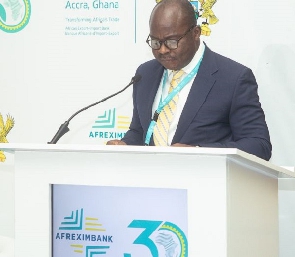 BoG Governor, Dr. Ernest Addison
BoG Governor, Dr. Ernest Addison
The Bank of Ghana (BoG) Governor, Dr. Ernest Addison, has underscored the importance of policies that enhance economic buffers and promote African-Caribbean trade.
Dr. Addison, who spoke during the 30th Annual Meetings of Afreximbank shareholders in Accra, stated that shared history, untapped markets and immense potential make it an obvious choice for strategic collaborations.
He highlighted the need for policies that “improve resource mobilisation, enhance savings for development and growth, and develop domestic financial markets”, noting that such policies are critical in addressing the twin ills of poverty and unemployment which plague both regions.
The Governor added that particular emphasis must be placed on closing existing infrastructure gaps – especially in air and maritime transportation – hindering trade between the two regions.
“The biggest problem we have with African-Caribbean trade is the major infrastructural potholes. We need to encourage investment in air and maritime transportation. That infrastructure bottleneck continues to be a major obstacle to promoting trade between Africa and the Caribbean,” Gov. Addison stated.
Currently, trade between both regions mirrors the comparatively low levels of intra-African trade despite strong historical ties. Official figures show that it stood at just under US$1.5billion by the end of 2021.
In the case of exports from the Caribbean Community (CARICOM), an economic bloc consisting of 15 countries, Africa accounted for a mere 4.4 percent of its total US$18.8billion exports – amounting to approximately US$800million.
Similarly, in terms of imports only US$603million of the US$33billion imported by Africa originated from the region. It is worth noting that Africa imports around US$4.5billion worth of fish annually, but less than one percent of that comes from the Caribbean – an indication of the significant potential for strengthening commercial ties between the two regions.
Experts project that trade between Africa and the Caribbean can experience rapid growth in the coming years, with a potential increase of US$1billion over the next five years. This growth is expected to encompass various sectors including agrifood, healthcare, tourism, fertiliser and automobiles.
To achieve this, however, Dr. Addison stated that central banks will prove crucial in creating an environment that propels growth through financial sector policies.
Taking stock, looking forward
At the event, which coincided with the Afreximbank’s 30th anniversary celebration, the BoG chief stated that the theme ‘Delivering the vision: Building prosperity for Africans’ was apt as the continent is on the verge of transformation.
He said it presents a great opportunity to reflect on Africa’s recovery after the pandemic, accelerate intra-African trade, improve Africa’s trade performance globally, promote industrial development and enhance capital flows into the continent.
“The chosen theme appropriately offers an opportunity to all stakeholders gathered here, not only to celebrate the success of Afreximbank over the last thirty years but also to reflect on how we can meaningfully contribute to Africa’s recovery process after the pandemic,” he said.
The Governor also highlighted the significant contributions of Afreximbank over the past three decades, as a leading supranational financial institution supporting African trade and driving growth across multiple sectors.
Afrieximbank’s interventions include infrastructure investments, support for agriculture and industry, trade facilitation, advisory services and country-specific programmes to assist nations facing economic challenges.
Dr. Addison stated that Afreximbank has transitioned into a first-class supranational financial institution, championing African trade and driving growth across various sectors. The bank’s interventions have encompassed infrastructure investments, agriculture and industry support, trade facilitation, trade guarantee and advisory services, and country-specific programmes.
Afreximbank has achieved significant milestones aligned with the vision of Agenda 2063; such as establishing the Trade Impact Mitigation Facility platform, which disbursed over US$8billion to prevent trade debt defaults during the COVID-19 pandemic. The bank has also provided substantial financial support to member-states and businesses during the Russian-Ukraine crisis.
Prior to implementation of the African Continental Free Trade Area (AfCFTA) in 2021, Afreximbank disbursed over US$20billion to support intra-African trade and investments. The bank aims to double this amount to US$40billion by end of December 2026.
To promote intra-African trade, the development institution is actively financing African-owned financial institutions in their acquisition of foreign banks operating in member-states, thereby building an interconnected African financial system.
The bank has collaborated with over 500 regulated commercial banks through the Afreximbank Trade Finance Facility, providing trade credit confirmation lines to support intra-African trade.
Its collaboration with the African Union Commission and AfCFTA secretariat includes implementing the biennial intra-African trade fairs and establishing the AfCFTA Adjustment Fund. These initiatives aim to facilitate trade and investments within Africa, assist countries in adjusting to tariff removals under the AfCFTA, and prepare them for the new trading regime.
Governor Addison highlighted successful partnerships between Ghana and Afreximbank, particularly in sectors such as cocoa production, energy generation and foreign exchange liquidity support. Over the years, collaborations between Ghana and Afreximbank have resulted in the disbursement of over US$2billion to support various development and trade-related initiatives in the country.
“We in Ghana have benefited from a cordial and productive relationship with Afreximbank over the years,” he added.